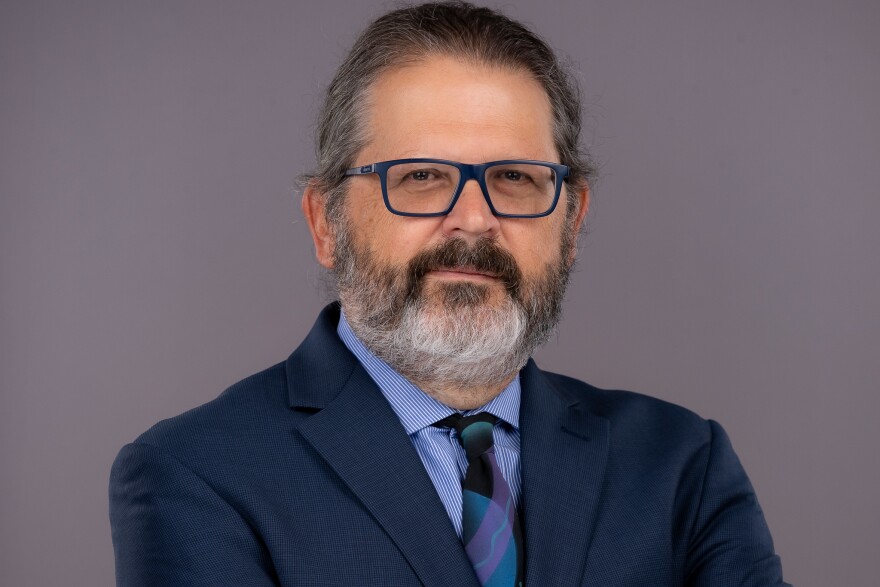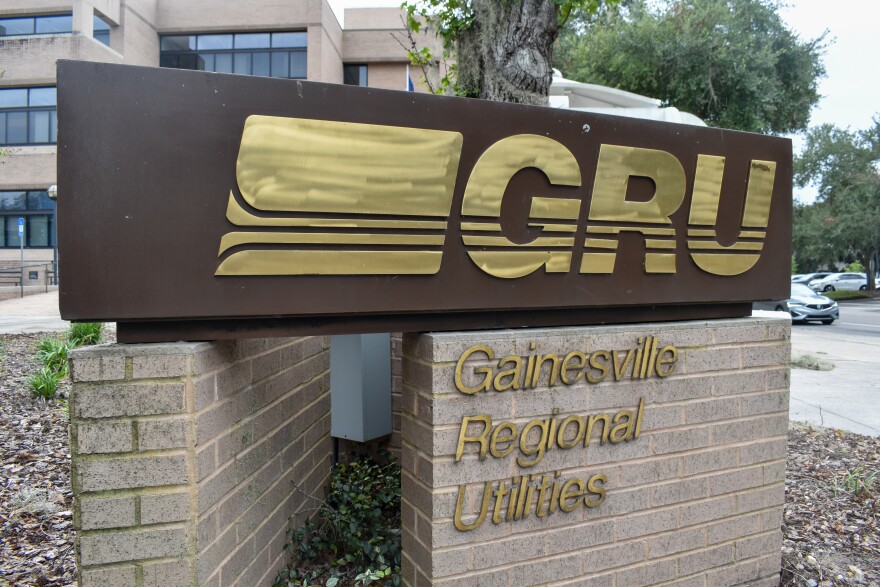Q&A: GRU CEO Ed Bielarski on Gainesville’s November referendum for utility control
GAINESVILLE –– On Nov. 4, Gainesville voters will decide who should control Gainesville Regional Utilities: the Gainesville City Commission or the governor-appointed GRU Authority.
Last year’s referendum, which would have returned GRU to city control, was thrown out by a judge because of misleading ballot language. Now, voters will get another chance.
WUFT’s Emma Tufano spoke with GRU CEO Ed Bielarski about his perspective on the Authority’s role as voters prepare to decide who should control the utility.
The following Q&A and audio have been edited and condensed for length. Listen above or read below.
This interview was edited and condensed for clarity. Listen above or read it below.

Tufano: What’s at stake here for GRU and the Authority?
Bielarski: Well, the very existence of the Authority is at stake. The referendum seeks to dissolve the Authority, immediately upon certification of the election. So, it has a lot of ramifications.
The impact to GRU would then be put back under the governance of a system that we, and an organization, that we all know too well how they operate. They burdened the utility with $2 billion of debt, the highest electric rates in the state, and took $68 million more than the utility earned from 2018 to 2021.
Tufano: So that kind of leans more into my second question. Specifically, why do you think or believe that the Authority should continue to govern GRU?
Bielarski: Well, first off, the Authority has done a good job over the past two years. Our residential electric bill went from $156 to $137 during a period. And by the way, the $156 was the highest in the state, and now we're the 14th-highest. And while we were going down, other folks were remaining the same. So, we've done a great job with that.
Tufano: If voters approved the referendum and control moves back to the City Commission, what impact do you believe that would have on GRU’s rates, services and finances?
Bielarski: Well, based on what the City Commission is saying and the fact that you can't have it all, as President Obama famously said, the rates or the bills will necessarily increase. There's no other way that that can't happen.
Tufano: GRU serves thousands of customers, also outside of the city, who cannot vote in the referendum. How are their voices impacted in this vote, and how would they be best represented, do you think?
Bielarski: Well, they're best represented by the Authority, because one or two members of the board are appointed that live outside the city. So today, under the Authority, they're called extraterritorial customers; they're outside the corporate limits of the city of Gainesville, so they're represented.
So, when people say, “let the people decide,” well, guess what? Or “let the people’s vote count.” Right now, 100% of GRU customers’ vote counts because they vote for Florida legislators who enacted the bill, and they're being represented at the state level, at an objective level, as opposed to a subjective level, within the municipality, that put the utility in financial danger and risk. So, there's 35%, give or take, that don't get a chance to vote in this referendum, that will lose their representation on the Authority Board.
Tufano: Why did the Authority choose to pursue legal action, and what do you say to critics who see that as silencing voters?
Bielarski: The city is silencing voters. They're the ones that are silencing the rights of the customers outside of the city limits that have representation now. I mean, there's just no two ways to look at that. You know, on November 4 (Nov. 4), those people have representation at a board meeting that we're having tonight, and after November 4 (Nov. 4), they won't have representation. So, I asked those people, “whose voices are being silenced?”
The other part to that is there's an obligation on the part of the City Commission to put forth a referendum that's not confusing and not deceptive. The original vote was set aside because it was deceptive, and Judge Wright decided that you can't count a vote of 73% when people don't know what they're voting for.
I mean the referendum, nowhere in it does it say “GRU.” You would think right that if you're having the people decide on what's going to happen with the governance of GRU, you would once mention GRU, but they don't.
Tufano: What is one thing that you would want to say to the GRU customers, for them to remember as they keep in mind, going out to vote in November?
Bielarski: We have talked the talk. We've walked the walk at the Authority since October first of 2023. (Oct. 1, 2023) Your bills have went down. Service has improved. We're not the highest in the state. Bond rating agencies agree with the plan that we've set forward, which means that interest rates will continue to stay low for the Authority. We're at a 15 year low in terms of workforce, which means that we're making every one of our employees more productive, more efficient.
So, if you want your utility rates and bills to go up, vote yes. If you want them to continue being lowered and lower, or at least to the middle of the pack in the state, vote, no.
This interview was transcribed using AI tools and reviewed for accuracy.


